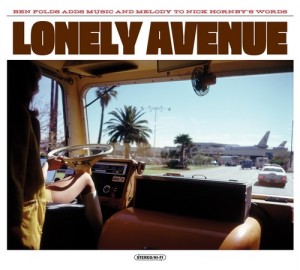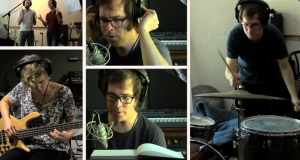
While Ben Folds hasn’t had a serious radio hit since “Brick” off of his sophomore release, Whatever And Ever Amen, take it from me, he’s doing just fine. In fact, he could probably trademark the phrase “cult following.” Steady releases since 1995 and a passion for quirky, innovative projects have made Folds a staple on the contemporary rock scene for nearly 15 years, with Folds, now 44, continuing to sell out shows around the globe. Most often recognized for his reworking of the Dr. Dre hit “Bitches Ain’t Shit,” his live-in-concert ChatRoulette escapades and his stint as a judge on NBC’s a cappella competition The Sing Off, Folds has proved himself to be hilarious, prolific and pretty damn talented.
On his most recent record, Lonely Avenue, Folds collaborates with renowned English novelist Nick Hornby (High Fidelity, About A Boy). Folds put Hornby’s words to music, creating a record that, quite unusually, reads like a book of short stories. The album is rife with the thoughtful, deep and melancholy, though balanced by Hornby’s characteristic injection of inanity. Two of the record’s most moving songs are “Claire’s Ninth,” which laments the interruption of a young girl’s innocence by her parents’ divorce, and “Picture Window,” a rejection of the false promises of hope by a mother whose son lies perpetually ill in a hospital bed. One of the more upbeat highlights includes “Saskia Hamilton,” a loud and glittery ode to a poet’s name.
Another gem is “Levi Johnston’s Blues,” which tells the story of Johnston’s quite public coming-of-age. The song is humorous in its portrayal of Johnston’s hick-like ignorance (the chorus quotes Johnston’s infamous MySpace page directly: “I’m a fuckin’ redneck, I live to hang out with the boys, play some hockey, do some fishin’ and kill some moose…), yet it delves into the harshness of the experience too, proving that Folds and Hornby aren’t simply jokesters solely out there to poke fun.
In a way, the record feels disjointed. Longtime Ben Folds fans might be a bit too aware that the lyrics aren’t written by the musician they’ve grown to love, and in that sense, the record is a major departure from Folds’ previous releases. If Folds should have worked with any novelist, however, Hornby is the right one. He’s clever, inquisitive, irreverent and just as wacky as Folds himself; the two are the closest thing to a musical match-made-in-heaven that you’re ever going to find.
Overall, Lonely Avenue is a hit. There are highs, lows and just enough Hornby-an (and perhaps even Folds-ian) wit to please even the most die-hard fans. So give it a listen. And while you’re at it, check out the Quad’s exclusive interview with Ben Folds below.
Are you excited to start the tour?
Yeah! It’s always great to start a tour. Always nice to start, and always nice to get home, you know?
Definitely. So to start off – what can you tell us about the basic concept behind the new record?
Sure. There wasn’t any sort of lyrical concept behind the album, or anything. Nick would send me his lyrics by email, and I would write to them.
Where did you get the idea for this type of project, someone else writing lyrics for you? What was the initial inspiration?
Nick and I have been talking about it for a while. I can’t remember when we exactly began this project… it’s been a while. I mean, it just really made sense. He’s a writer, and I write to lyrics. Usually what I do is write my own lyrics, and I’ve always been really happy when I had a good set of lyrics to write music to. When we decided we were going to do this, it was all pretty quick and easy.
Was it hard to translate someone’s work into music?
It wasn’t difficult. Every set of lyrics presents its own unique challenge, but most of it comes to me pretty quickly. There are definitely humps that you got to get over in order to make it flow and feel right, but for the most part, it all happened quickly.
Was there any correspondence after you would write a song? Like, did Nick have any sort of opinion when it came to the musical side of things?
I would send him an MP3 usually within twenty four hours of his sending me an email. I mean, most of them he simply liked and there wasn’t much to say. A couple times he seemed a little confused as to why I took a certain direction, but that confusion didn’t last long… he sunk in pretty soon. I think sometimes that, if you have some sort of preconceived notion of what a song should be like, it takes a while to sink in. But yeah, he was immediately pretty happy with the music that I’d written.

It sounds to me that Nick’s lyrics really tell a story and there really isn’t that much that’s too abstract. Is that something you both aimed for, or do you think that it’s something inherent to working with a novelist?
I think there they’re more explicit and implicit than your average rock lyrics, sure. But they’re definitely more abstract than one might think, because they all have defining moments that resonate for reasons that you wouldn’t initially expect.
What do you mean by that, exactly?
Well, something like “Levi Johnston’s Blues” is not really about Levi Johnston so much as it’s about growing up and those scary moments of truth, you know? Those watershed moments in life that say “hey, this is when you’ve grown up!” It’s a coming of age story, in a way. And Nick’s chosen a good subject for that type of theme for two reasons. One, [Johnston’s case] was a public display. When you’re a kid growing up, things seem really dramatic, as if the whole world is in on it, when it’s really just your little life. But Levi’s situation was all acted out on stage at the Republican National Convention. That makes for a moment that really resonates with people. The other reason is because, obviously, when Nick wrote that lyric, Levi Johnston wasn’t really in the news that much. [Johnston] wasn’t as famous as he is now, so back then, Nick picked a winner, so to speak.
Speaking of “Levi Johnston Blues,” have you heard at all from Johnston or the Palin camp?
No, and I don’t really expect to. I would hope that Levi would appreciate that we’re on his side. Well, not politically speaking [laughs]. But we empathize with him. We empathize with the person that’s in the story, and a part of that person is Levi.
Right. So, in your own words, how do you think this record is different from your previous ones? Did you try to create something radically different?
I mean, I think it’s really important to be in the moment when you make a record, and it’s a tough balance because you learn from what you’ve done before. But I don’t think I ever set out to do something different or not different. I think the thing to do is to create something that honestly makes you happy, moves you… whatever it is that you’re going for. In that way, this record was no different than my previous records. My real goal was to go in and be excited about what came out of the speakers. So yes, there’s definite stylistic differences here and there, but those stylistic differences don’t drive the record. It’s important, I believe, to make records feel like they’re your first record. Not to say that it should sound like it’s your first record; rather, that your reason for making it was that you really needed to hear it come out of those speakers. It’s easy on subsequent records to compete with your older self or to try to relive some kind of magic or to live up to certain expectations… but I don’t think any of those things should come into play when making a record.
Do you think that having each album “sound like your first” has helped you stay relevant?
I mean, that’s not the reason for doing any of that. But I do what I do to try to keep it fresh, and if the tide is on your side, then all the better… I’ll have made something that’s relevant to other people. But if you’ve had a completely different experience, you may not relate to so many people… when you create your most honest work, it may actually alienate people. But you still have to do what you do, and if you stay prolific enough, eventually the tide will be on your side. That’s my philosophy, at least.
So I recently saw that you collaborated with YouTube sensation Pomplamoose on one of their “VideoSongs.” I thought it was wonderful, as I’ve actually been fans of theirs for a long time…
Yeah, they’re great.

What was it like working with them?
Well I met Jack Conte at a sort of a geeky little web conference that we were both at. We were both on a panel discussing YouTube and its relationship to art and, you know, we just got along really well. I was looking at what he and Nataly do, and I was really really blown away. I think that Pomplamoose ought to own the “VideoSong.” It’s a really neat innovation… a really honest presentation. If I was going to do one, I wanted them to be involved so that they get credit for it. And it turned out great.
Going back to Lonely Avenue for one last question, what do you hope people – both old, die hard fans of yours and new listeners – will take away from this record?
I think the important thing with a record like this is to allow it to find some context. The context in this case is the lyrics… the lyrics in terms of short stories. That’s the life of the record. So, I hope that people will be patient with the record and sit down somewhere they can really listen to the lyrics… it’s a more generous offering in that way. But I’m also fine if people just enjoy it! I don’t make something that doesn’t move me on some level, so I always hope that it does the same for other people.
Ben Folds will be performing at the Orpheum Theatre on Wednesday, Nov. 17th at 7:30 PM. To watch Folds and Hornby introduce the new record, visit BenFoldsTV on YouTube, and find the rest of Folds’ tour dates here.

One Comment on “A Conversation with Ben Folds”